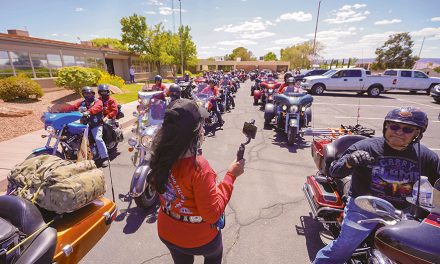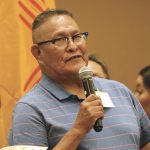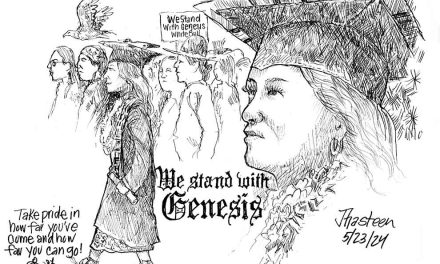
Naabik’íyáti Committee supports virtual attendance of chapter meetings: Legislation to override presidential veto on Navajo Council winter session agenda
By Marley Shebala
Special to the Times
WINDOW ROCK – The Naabik’íyáti Committee recommended that the Navajo Nation Council override President Buu Nygren’s veto resolution that would approve virtual attendance at chapter meetings
Without debate, the Naabik’íyáti Committee voted 16 in favor, and 3 opposed Legislation 0255-23, which seeks Navajo Council approval to override Nygren’s Nov. 3, 2023, veto of Navajo Council resolution CO-85-23. On Oct. 17, 2023, the Council voted 16 in favor and 3 opposed to resolution CO-85-23, which approved virtual attendance and voting by registered voters at chapter meetings.
The legislative staff reported in a Friday press release that 0225-23, the presidential override legislation, is scheduled to go before the Navajo Council during its annual winter session from Jan. 22 to 26.
No mandate for virtual attendance
Navajo Council Health, Education, and Human Services Committee Chairman Vince James, who is sponsoring 0255-23, stated in a Friday press release that 0255-23 does not mandate that chapters allow virtual attendance.
Nygren, in his Nov. 3, 2023, veto message to the Navajo Council, stated that he used the presidential veto because “personal presence and engagement of our tribal leaders with their constituents at open meetings allows for meaningful, thoughtful, and collaborative debate, which allows everyone to work toward a resolution. Virtual attendance diminishes and undermines the personal involvement that leaders have with their voters and community members.”
He added that after reading the resolution and public comments, he saw one issue. It appears to be obtaining a quorum, which chapter officials are encouraged to address at the chapter level.
Helps establish quorum
Nygren stated that another issue appears to be community engagement. He suggested that chapter officials create solutions for community members and voters to engage in government and local matters.
He noted, “We should be asking ourselves, ‘What are we doing to engage our community members in the local governance process?’ Further, if community members are not interested in participating in local matters, perhaps this opens the door to discussions on government reform at the local level. Is there a better form of government? Virtual attendance does not fix these issues.”
However, according to public comments on the virtual meetings legislation, chapter officials reported that attendance by community members has increased with the availability of virtual capabilities such as calling-in and Zoom.
Iyanbito Chapter President Seneca Becenti said, “Lately, we have had a rough time meeting our 25 quorum. With the virtual meeting, we didn’t have a problem meeting our quorum. We have community members that would like to join our meeting virtual and phone calls, being that they (reside) outside of our community but are registered voters with the Iyanbito Chapter.”
Wide Ruins Chapter Vice President said the chapter, which supports virtual meetings, has not reached a quorum since the reopening of the chapter after the COVID-19 pandemic.
The 110 chapters were reopened on Jan. 20, 2023, when Nygren, then Council Speaker Pro Tem Otto Tso, announced in a Jan. 20, 2023, joint press release that the COVID-19 mask mandate was lifted.
According to the Navajo Office of Environmental Health and Protection, lifting the mask mandate applies to public spaces, including the 110 chapters. It leaves wearing masks optional for the public and businesses.
The health order continues the indoor mask requirement for early childhood education, primary and secondary schools, nursing homes, healthcare facilities, and individuals with COVID-19 symptoms, positive tests, or exposure.
Legislative public information office staff stated that the presidential veto override legislation 0255-23 supports the Navajo Nation Local Governance Act by recognizing local governance and empowering chapters to make these decisions.
Doreen Rehbock, a voter of the Low Mountain Chapter, stated in her public comment in support of virtual attendance that it had allowed community people, single parents, and those without childcare to attend and participate in chapter meetings.
Veterans use virtual family meetings
Rehbock and Lois Watts, a Houck chapter and veterans organization member, stated that virtual meetings help veterans participate in chapter meetings. “Our armed forces have increased their knowledge of virtual family meetings,” Watts stated.
The Low Mountain Veterans Organization stated in an Aug. 27 press release supporting the resolution that virtual attendance would allow “transparency” and voters a “voice” in their local Navajo Nation government.
“Some chapters do not share meeting minutes on their official chapter websites. It causes room for deception and little to no communication within its community areas,” the Low Mountain veterans stated in their resolution.
The Low Mountain veterans recommended that the Navajo Council amend Navajo laws to allow chapter members to withhold the meeting stipends of chapter officials until chapter meeting minutes are electronically posted on chapter websites.
Residing on and off-reservation
Rehbock Watts stated that virtual meetings would also help elders, people with disabilities, students attending college, university, or trade school, hospitalized community members in nursing homes, working off the Navajo Nation, and Navajos relocated off the Navajo Nation.
She emphasized that virtual meetings would also strengthen the emergency response of chapters to other health emergencies such as COVID-19, and to inclement weather, wildland and structural fires, emergency evacuations and shelters, and especially for locating a missing person, because hundreds of community members could be immediately alerted for sightings and information.
“We should be able to keep them all connected to their people, their home, and their government,” Rehbock Watts said. “To deny such a right would be shameful. As many elected candidates brought up during their election, ‘The Navajo Nation lacks technology. We, the Navajo Nation, are so far behind in the world of technology.’ So, if that is the case, then why would the Navajo Nation stop the usage of virtual chapter meetings or any type of live streaming of any of our government committees? We need to move forward, not take steps backwards.”
Public comments on legislation 0225-23, the override of Nygren’s veto of the Navajo Council’s resolution CO-85-23, should be emailed to comments@navajo-nsn.gov, the Navajo Nation Office of Legislative Services in Window Rock.







 Highway 264,
Highway 264, I-40, WB @ Winslow
I-40, WB @ Winslow